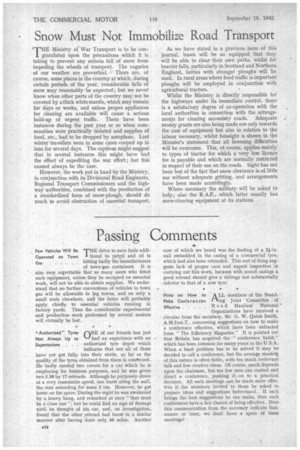Snow Must Not Immobilize Road Transport T HE Ministry of' War
Page 14

If you've noticed an error in this article please click here to report it so we can fix it.
Transport is to be congratulated upon the precautions which it is taking to prevent any serious fall of snow from impeding the wheels of transport. The vagaries of our weather are proverbial. There are, of course, some places in the country at which, during certain periods of the year, considerable falls of snow may reasonably be expected ; but we never know when other parts of the country may not be covered by a thick white mantle, which may remain for days or weeks, and unless proper appliances for clearing are available will cause a serious hold-up of urgent traffic. There have been instances during the past year or so when communities were practically isolated and supplies of food, etc., had to be dropped by aeroplane. Last winter travellers were in some cases cooped up in inns for several days. The captious might suggest that in several instances this might have bad the effect of expediting the war effort ; but this cannot always be the case.
However, the work put in hand by the Ministry, in conjunction with its Divisional Road Engineers, Regional Transport Commissioners and the highway authorities, combined with the production of a standardized form of snow-plough, should do much to avoid obstruction of essential transport. As we have stated in a previous issue of this journal, buses will be so equipped that they will be able to clear their own paths, whilst for heavier falls, particularly in Scotland and Northern England, lorries with stronger ploughs will be used. In rural areas where food traffic is important ploughs will be employed in conjunction with agricultural tractors.
Whilst the Ministry is directly responsible for the highways under its immediat6 control, there is a satisfactory degree of co-operation with the local authorities in connection with the arrangements for clearing secondary roads. Adequate money grants are also being made not only towards the cost of equipment but also in relation to the labour necessary, whilst foresight is shown in the Minister's statement that all licensing difficulties will be overcome. This, of course, applies mainly to types of tractor for which a very low licence fee is payable and which are normally restricted in respect of their use on the roads. Sight has not been lost of the fact that snow clearance is of little use without adequate gritting, and arrangements have been made accordingly.
Where necessary the military will be asked to help ; also the R.A.F., which latter usually has snow-clearing equipment at its stations.




















































